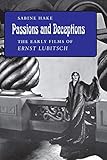Passions and Deceptions : The Early Films of Ernst Lubitsch / Sabine Hake.
Material type: TextPublisher: Princeton, NJ : Princeton University Press, [2020]Copyright date: ©1993Description: 1 online resource (232 p.)Content type:
TextPublisher: Princeton, NJ : Princeton University Press, [2020]Copyright date: ©1993Description: 1 online resource (232 p.)Content type: - 9780691222059
- Silent films -- History and criticism -- Germany
- Silent films -- Germany -- History and criticism
- PERFORMING ARTS / Film & Video / History & Criticism
- Angel
- Anna Boleyn
- Austernprinzessin, Die
- Berger, Ludwig
- Bergkatze, Die
- Blind Husbands
- Boese, Carl
- Bourget, Jean-Loup
- Buchanan, Jack
- Buchowetzki, Dimitri
- Capra, Frank
- Carmen
- Chevalier, Maurice
- Colbert, Claudette
- Corliss, Richard
- Danton
- Davidson, Paul
- Design for Living
- Dingelmann, Wilhelm
- Doane, Mary Ann
- Dreier, Hans
- Durgnat, Raymond
- Ebert, Friedrich
- Eisenstein, Sergei
- Eisner, Lotte
- Fall, Leo
- Forbidden Paradise
- Ford, John
- Froelich, Carl
- Fräulein Seifenschaum
- Genuine
- Grafe, Frieda
- Gregor, Ulrich
- Hallelujah
- Hasenclever, Walter
- Hintertreppe
- HufF, Theodore
- If I Had a Million
- Intolerance
- Iser, Wolfgang
- Jacobs, Lewis
- Janson, Victor
- Kracauer, Siegfried
- Lang, Fritz
- Lombard, Carole
- Monsieur Beaucaire
- Negri, Pola
- Ossis Tagebuch
- Oswalda, Ossi
- Porten, Henny
- Rausch
- Réveillon
- Shearer, Norma
- Tannenbaum, Eugen
- 791.430233092
- PN1998.3.L83
- PN1998.3.L83
- online - DeGruyter
| Item type | Current library | Call number | URL | Status | Notes | Barcode | |
|---|---|---|---|---|---|---|---|
 eBook
eBook
|
Biblioteca "Angelicum" Pont. Univ. S.Tommaso d'Aquino Nuvola online | online - DeGruyter (Browse shelf(Opens below)) | Online access | Not for loan (Accesso limitato) | Accesso per gli utenti autorizzati / Access for authorized users | (dgr)9780691222059 |
Browsing Biblioteca "Angelicum" Pont. Univ. S.Tommaso d'Aquino shelves, Shelving location: Nuvola online Close shelf browser (Hides shelf browser)

|

|

|

|

|

|

|
||
| online - DeGruyter The Age of the Bachelor : Creating an American Subculture / | online - DeGruyter Groundless Belief : An Essay on the Possibility of Epistemology - Second Edition / | online - DeGruyter Historia Patria : Politics, History, and National Identity in Spain, 1875-1975 / | online - DeGruyter Passions and Deceptions : The Early Films of Ernst Lubitsch / | online - DeGruyter Joyless Streets : Women and Melodramatic Representation in Weimar Germany / | online - DeGruyter Friedrich Nietzsche and the Politics of the Soul : A Study of Heroic Individualism / | online - DeGruyter Colonial Identity in the Atlantic World, 1500-1800 / |
Frontmatter -- Contents -- Illustrations -- Introduction -- Part I THE EARLY LUBITSCHAN OVERVIEW -- One. From Comic Actor to Film Director, 1914—1918 -- Two. The German Feature Films, 1918—1922 -- Three. Hollywood—The Silent Films, 1923-1929 -- Four. The American Sound Films, 1929-1932 -- Part II FILM ANALYSES -- Five. Wayward Women: The Oyster Princess, The Doll, and The Mountain Cat -- Six. The Period Film as Palimpsest: On Passion and Deception -- Seven. The Tyranny of Vision: So This Is Paris and Others -- Eight. Exploring the Boundaries of Sound: Monte Carlo -- Nine. The Object, the Image, the Cinema: Trouble in Paradise -- Afterword -- Select Bibliography -- Index
restricted access online access with authorization star
http://purl.org/coar/access_right/c_16ec
A collaborator with Warner Brothers and Paramount in the early days of sound film, the German film director Ernst Lubitsch (1892-1947) is famous for his sense of ironic detachment and for the eroticism he infused into such comedies as So This Is Paris and Trouble in Paradise. In a general introduction to his silent and early sound films (1914-1932) and in close readings of his comedies, Sabine Hake focuses on the visual strategies Lubitsch used to convey irony and analyzes his contribution to the rise of classical narrative cinema. Exploring Lubitsch's depiction of femininity and the influence of his early German films on his entire career, she argues that his comedies represent an important outlet for dealing with sexual and cultural differences. The readings cover The Oyster Princess, The Doll, The Mountain Cat, Passion, Deception, So This Is Paris, Monte Carlo, and Trouble in Paradise, which are interpreted as part of an underlying process of negotiation between different modes of representation, narration, and spectatorship--a process that comprises the conditions of production in two different national cinemas and the ongoing changes in film technology. Drawing attention to Lubitsch's previously neglected German films, this book presents the years until 1922 as the formative period in his career.
Mode of access: Internet via World Wide Web.
In English.
Description based on online resource; title from PDF title page (publisher's Web site, viewed 07. Nov 2022)


